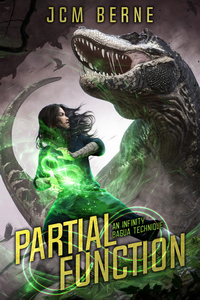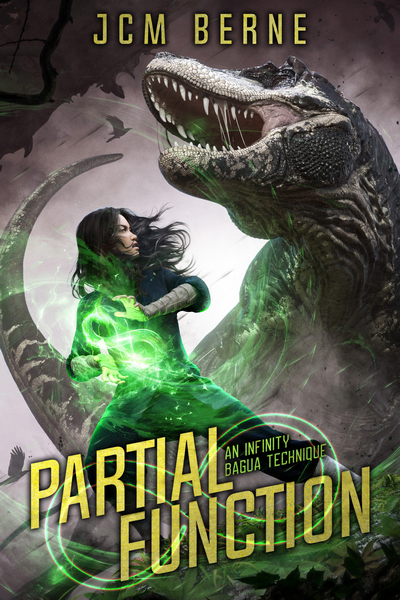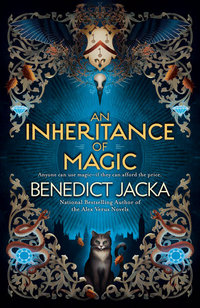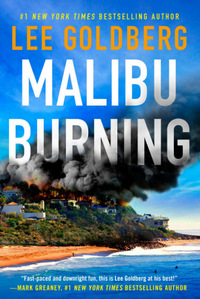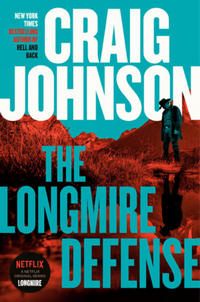by JCM Berne
DETAILS:
Publication Date: November 7, 2023
Format: eARC
Length: 361 pgs.
Read Date: October 9-10, 2023

The First Chapter
Don’t worry, I’m not about to go through this book chapter-by-chapter talking about each one—there are thirty chapters, and while I know I can go on and on about books that I like…
No, I’m going to focus on the first chapter for a moment for one reason—your reaction to the first chapter is going to tell you everything you need to know about this book. If you read that chapter (and everyone who’s stumbled onto this post should do at least that) and you think “Yeah, I can see myself enjoying this book.” You almost certainly will. If you read it and think, “Oh yeah! Give me more of that!!” You definitely need to read on. If you read this chapter and aren’t that interested in going on—trust that instinct and move on with your life. Also, I feel bad for you. (but I say that without judgment, even if it doesn’t sound like it).
This chapter isn’t quite the novel in microcosm, but it comes close—it has the spirit, the humor, the action, the supernaturally-charged martial arts, and the panache that will characterize the rest of the book. Anddddd, best of all, it features a very good dog. The book will bring in more characters than just Akina Azure and her dog (frustratingly named Dog*), which is the biggest reason I can’t say this chapter is a microcosm.
* It’s not just this that Akina has in common with Walt Longmire—I actually could write a post comparing the two—but this is my biggest complaint with both of them. You two have great canine companions, they deserve a great name.
So, What’s Partial Function About, Anyway?
I don’t know that I can do better than the description I was given for the cover reveal a couple of weeks ago—I’ve tried, and I keep unintentionally borrowing elements from it, so let’s just use it:
If Taken starred Michelle Yeoh and was set on a Jurassic Park-inspired Cradle.
Monster hunter Akina Azure inherited the most powerful weapon in the martial world before retiring to a peaceful life raising her twin girls.
The Reaver has them kidnapped, thinking Akina will trade that weapon for their safe return.
Will she? Or will she use it to wreak a terrible retribution on the men who took her girls?
You get one guess.
I’ll expand a bit on that, though.
Akina was part of a legendary band of adventurers, The Five Fangs, and then she and her husband Petrick (also one of the band) retired to go live far away and start a family. None of their friends have seen—or heard—from them or of them in years. Long enough for them to raise twins into their teens before Petrick died of blood plague (I don’t know what that is, but the name alone…).
Now, Akina tracks down one of the Fangs, Remy, to help her. She needs his connections to put her in touch with the people she needs to put her rescue plan into action. It wouldn’t hurt to have one of the few people alive that she trusts to have her back, either.
Remy isn’t crazy about the idea, but he can’t say no to Akina. These two past-their-prime warriors are soon joined by a much younger fighter (who is not quite in her prime and has a lot to learn first) that they can’t entirely trust, but can certainly use. Three people and a dog against the most powerful, feared, and twisted warrior (and his army) living. That’s if they can dodge the kaiju-esque monsters along the way.
It’s really not a fair fight.
Fantasy’s Answer to Sam Axe
I predict that most people talking about this book are going to focus on Akina—as they should. And I’m tempted to spend a lot of time talking about Dog, because he’s such a good boy.
But I want to hone in on Remy for a bit. He’s so essential to the way this book works, and I think he’s so easy to overlook. Sure, Akina and Zhu have some good, snappy, dialogue, and Dog being dog is amusing. Remy’s easily the funniest character in the novel and can be seen as only comic relief. That’s an error.
A couple of days ago, in an earlier draft of this post, I made a joke about him essentially being Sam Axe from Burn Notice. I haven’t been able to get that comparison out of my mind. It’s so on the nose. Remy serves as Akina’s Devil’s Advocate, voice of reason, conscience, and confessor. He’s the only one she fully trusts anymore. He knows someone (or knows someone who knows someone) everywhere they go and can get them whatever resources they need. In a fight, he’s almost as good as Akina and saves her on more than one occasion.
He covers all this with a commitment to doing nothing but drinking, womanizing, and lazing about all day—which is pretty much what he’s been doing since Petrick took Akina off to who-knows-where. When called upon, he steps into action, griping the entire time about how it’s cutting into his drinking. Again—Sam Axe.
If you’ve ever wondered what a wuxia-adjacent Bruce Campbell would be like, this is the book for you.
Okay, setting that all aside—at the end of the day, you’re going to like Remy and trust him to do the right thing more than pretty much anyone else in the book (see the next section for a hint of that). His agenda is pretty clear—do the right thing by his friend, do the right thing in general, and then leave everyone to their business so he can get back to pickling his liver. He may not understand the nuances of everything going on—but he’s honest, he’s clever, and he’s tough. Just the kind of guy you want to have around.
The Central Question of the Book
Most—possibly all—of the “bad guys” in this novel wouldn’t describe themselves that way. They think they’re doing the right thing to save the world, or at least civilization. Not just the right thing—the only thing that will save humanity.
But they’re so focused on the ends that they cross all sorts of lines when it comes to means. They do things to increase their power that are repugnant to the reader and just about every character in the novel. Honestly, kidnapping Akina’s twins in order to compel her to surrender her weapon is pretty much the mildest thing the “villains” like the Reaver do to secure the ability they think will help them.
It’d be easy to write them off here—ends don’t justify the means and all that, right?
But when you stop and think about the steps that Akina takes to enable her to rescue the twins? It’s hard to think of her as a hero (and she doesn’t pretend to be one, in fact, she outright denies it).
The novel focuses on Akina; she’s nice (generally) to Remy, Zhu, and her dog as they travel; she’s funny; she defends young women from creeps and slavers…and so on. So you reflexively think of her as a “good guy” a “hero.”
As we read Partial Function, we’re thinking about things like Taken. So let’s start there—are the actions that Bryan Mills takes to rescue Kim, the right thing to do? Sure some of them—but all of them? How about John Wick—think of the death and destruction that comes from him getting his vengeance? We’re inclined to think of Mills* and Wick as the heroes—but are they? I’d ask the same thing about Akina.
* Who am I kidding? None of us think of him as Mills, we think “Liam Neeson”—or “Liam Neesons,” maybe. No one thinks of him as Bryan Mills.
Now, that isn’t a criticism of her as a character. I loved Akina. I wanted to see her win, her whole plan was brilliant, I enjoyed watching her fight, banter, be corrected, and wreak vengeance. Maybe even more than I enjoyed Neeson or Wick doing the same.
I’m just not sure I should.
So, what did I think about Partial Function?
I have a couple of pages of notes that I can’t get to. There are so many quotable moments—because of heart or laughs. Berne’s got a way with words that I’m tempted to call Butcher-esque, and I just want more of it. But I need to get moving, so let’s just say that I had so, so, so much fun with this. Between this, Chu’s The War Arts Saga, and talking a little to Tao Wong this summer, I’ve decided I need to make more room in my reading for wuxia-inspired works.
The world-building deserves a paragraph or five to celebrate it (but it’s taken me 2 weeks to get this much written, I’m not risking putting this off any longer). For example, I should talk about the kaiju-ish creatures, but beyond saying they’re dinosaurish animals with powers that love snacking on humans (when they’re not stomping on them), I don’t know what to say. The political/clan system serves the whole thing well and I’d enjoy seeing more of it in a future installment.
Partial Function is a fast, enjoyable, action-packed read with a lot of heart and just enough humor to help you deal with the stakes and destruction. And these characters? I loved getting to know them and spending time with them. There’s a lot to chew on in these pages if you’re in a thoughtful mood, and if you’re not? You don’t need to, you can just enjoy the ride.
This was intended as a stand-alone, but the door is open for another adventure or so for the survivors. If we get a sequel, I’ll be first in line for it. If we don’t? This is going down as one of my favorite fantasy stand-alones. Either way—I’m encouraging you to read the first chapter and apply what I opened with. I’m sure there will be those who don’t get into this, but I can’t understand why.
Disclaimer: I received this eARC from the author—after repeated requests—in exchange for this post and my honest opinion.


 The most interesting incident Tuesday morning was my walking to a building on Thirty-fourth Street to enter a booth and push levers on a voting machine. I have never understood why anybody passes up that bargain. It doesn’t cost a cent, and for that couple of minutes, you’re the star of the show, with top billing. It’s the only way that really counts for you to say I’m it, I’m the one that decides what’s going to happen and who’s going to make it happen. It’s the only time I really feel important and know I have a right to. Wonderful. Sometimes the feeling lasts all the way home if somebody doesn’t bump me.
The most interesting incident Tuesday morning was my walking to a building on Thirty-fourth Street to enter a booth and push levers on a voting machine. I have never understood why anybody passes up that bargain. It doesn’t cost a cent, and for that couple of minutes, you’re the star of the show, with top billing. It’s the only way that really counts for you to say I’m it, I’m the one that decides what’s going to happen and who’s going to make it happen. It’s the only time I really feel important and know I have a right to. Wonderful. Sometimes the feeling lasts all the way home if somebody doesn’t bump me.![]()


